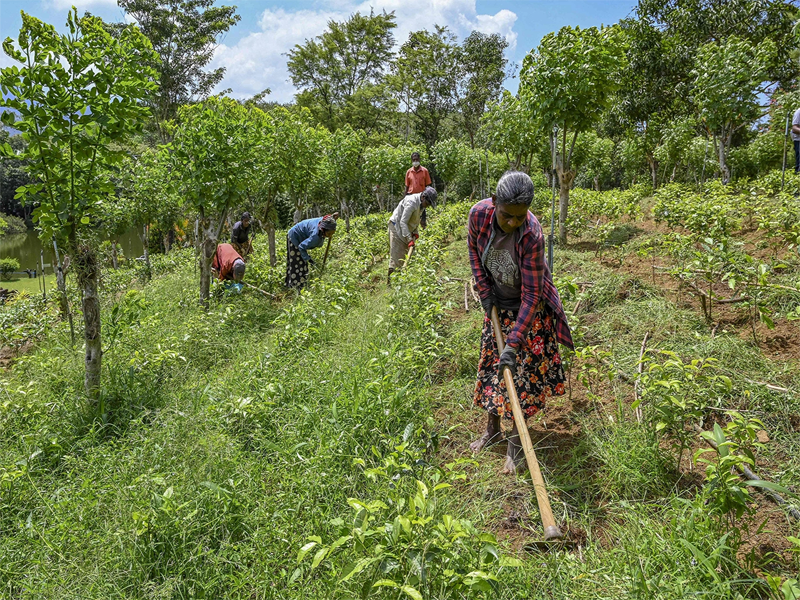FARMING - The ancient profession Issues faced by farmers

- 188
- 0
Shadowing the earliest occupation of farming in Pakistan is not a bed of roses. Despite its central position in the economic cycle of the country the farmer is not treated well by the governmental authorities dealing with agriculture.
In the uneven urbanization lush in the country the vital rural-based activities are pushed to the side and they do not figure prominently in the national scheme of things. Urban-based economic managers treat the farming community as an adjunct to national productivity and accord less priority to their needs and requirements.
The general view of the farming community in the social environment is not very encouraging as it is mostly portrayed as the artifact of the much criticized traditional outdated make-up. The social attitudes are not appreciative of the productive nature of agriculture and consider the provision of agricultural produce as their right. The hardworking and devoted farmer is equated with the typical feudal lord showing off in big SUVs and manipulating local and national politics.
General public is unaware how much struggle the farming community has to wage while cultivating agricultural produce. The hard physical labour involved in planting and reaping a crop is not something any one can do. His dependence on the vagaries of weather adds a very unpredictable element in his professional life and he is kept on tenterhooks till the produce is successfully reaped. The most tedious aspect of his endeavour begins when he takes his produce for selling in the market where his rightful dues are usually denied to him.
It is a well-known fact that the role of the middle-man is there to stay with all its unequal techniques. Year after year he will charge higher prices for the inputs provided for the crop, then will tie him up with usurious rates of interest on the loans he has advanced and to top it all he will buy his produce for less than its actual value. The state then cuts in and competes with the middleman to deprive the farmer by further cutting the price.
It is a matter of fact that the financial odds are always against the agricultural sector and it is very rare that he derives good advantage of his hard labour. All other stakeholders in the state try to keep the prices of agriculture products depressed citing fear of public reaction in case prices of edible commodities escalate. They churn out statistical evidence to prove their point of view and usually are successful in their efforts. The agricultural class on the other hand does not have access to sophisticated skills and finds it difficult to refute arguments provided by non-agricultural experts.
It is generally agreed by the economists that inflationary tendencies are dependent on much more factors than the escalating prices of food items only. Normally the economic resources of a state are geared in a way that they keep covering up costs involved in every sector of economy so that inflation is properly checked. But considering only an increase in prices of agricultural products as the cause of overall price increase is a misnomer and it negatively affects the entire agricultural community.
If viewed rationally, keeping the farmer less happy will surely discourage him and the result would be reduced food crops. Economic planners fail to realise that less availability of agricultural products will push their prices up. The farmers currently are left with no option but to opt out of traditional crops and go for cash crops that pay better. The farmer could not be blamed for changing over his tactics as he is forced to buy everything required for growing his crop on retail prices but he is forced to sell it on wholesale prices.
Pakistan's history replete of incidents that reveal that successive governments only raise prices of farm products under duress and for rest of the time government forcibly buys produce from the farmers and keeps a very tight control even on the bags required to pack the produces. The agriculturist is compelled to sell his produce at cheap rates as he does not possess the capacity to store it and moreover he has no access to an alternative market.
It is imperative that the state should review and rationalise prices of the agricultural inputs required for growing crops. The crop inputs should be made readily available and on time as planting of crops is dependent upon a particular time frame and any delay in their procurement could cause damage to the final crop. In order to keep the prices of inputs within the range of the farmer, the government should provide a regular subsidy.
Most importantly the farmer should not be denied the correct price of his produce and his expectation of a reasonable profit for his hard work should be kept in view. The price structure of the agricultural sector should cover the financial cost of production and all associated expenses. The infrastructure of the agricultural production areas should be improved facilitating farmers to carry out their chores comfortably.
There is a dearth of storage facilities for agricultural produce and the government should cater for them so that no wastage occurs.
Published in The Daily National Courier, August, 21 2023
Like Business on Facebook, follow @DailyNCourier on Twitter to stay informed and join in the conversation.

















































